How reliable are the bendairi texts. It seems like these guys are trying to project their lineage back to the founding of mogadishu to claim ownership and justify it.Yes this is very true and this is discussed by the the Tradition text piece by Cassaneli i linked above.
You see this also on the Northern-Eastern coast, visitors directly mention receiving genealogical lists and pieces of local history from record keeping Qadis on the coastal towns like Hafun.
About Southern Somalia and Mogadishu. Lee Cassaneli mentions few examples of these documents recording local histories on Southern/Benadiri area or about Ajuran(The Taxers) from families/individuals in the interior and on the coast
The Benaadir Past: Essays in Southern Somali History
Can't find the full text unfortunately but i have seen elsewhere that he makes references to them in this. But one of the documents he talks about is a chronicle set in the 17th century about Sheikh Hassan Buraale , who lived some thirteen generations ago ( c . 1625-1675 ) .
You are using an out of date browser. It may not display this or other websites correctly.
You should upgrade or use an alternative browser.
You should upgrade or use an alternative browser.
Where is the chronicles of mogadihsu
- Thread starter Midas
- Start date
Idilinaa
VIP
How reliable are the bendairi texts. It seems like these guys are trying to project their lineage back to the founding of mogadishu to claim ownership and justify it.
It wouldn't be accurate to say that their lineages are entirely false or just something projected back. The Benadiri genealogies tracing their long standing presence and importance in Mogadishu looks to be credible , because we have individuals mentioned in the lineages recorded to be emigrating there as early as the 12th century in external Arabic sources and then in some local tomb inscriptions. As for the founding of Mogadishu i touched a bit on that in a different thread: have a read.
The question of reliability extends beyond the benadiri texts into the general HoA manuscripts, as the screenshot you shared in a different thread discusses . The problem with reliability of these pre-existing local texts has to do with how they were later copied, re-composed and re-written at the turn of the 19th century, especially to fit a colonial narrative or a contemporary social-political advocacy or context which substantially differs from the original sources and the local traditions.
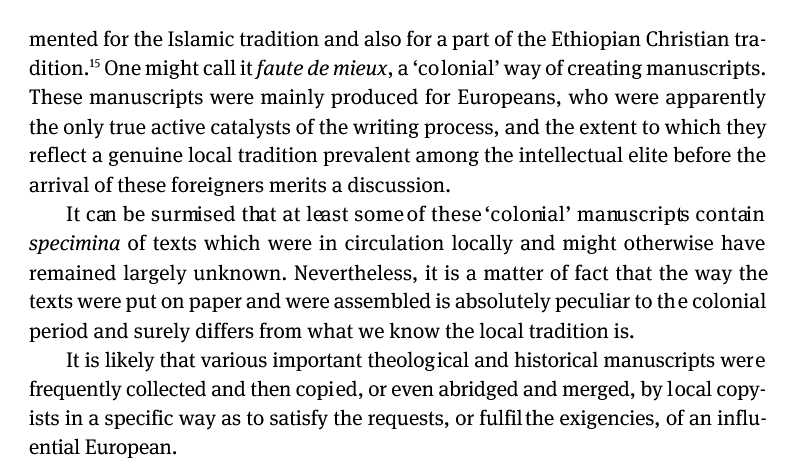
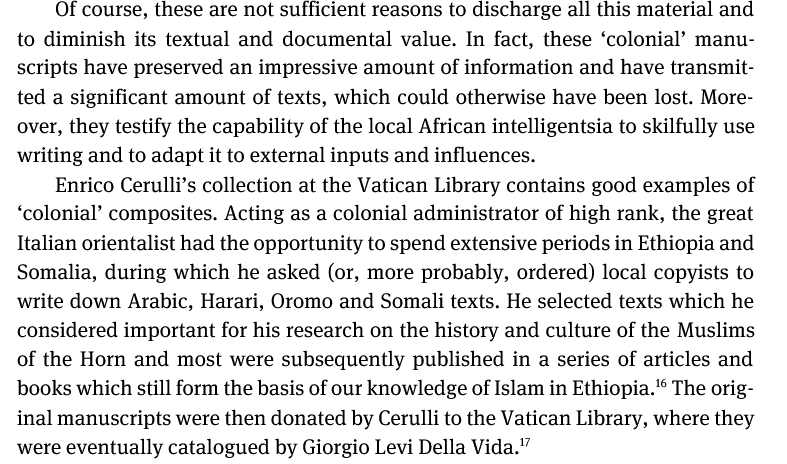
Last edited:
Intresting it looks like we need to do textual criticism of these mansucritps. But what about that sheikh sharif aydrus guy. His history of somalia is obviously very flawed .It wouldn't be accurate to say that their lineages are entirely false or just something projected back. The Benadiri genealogies tracing their long standing presence and importance in Mogadishu looks to be credible , because we have individuals mentioned in the lineages recorded to be emigrating there as early as the 12th century in external Arabic sources and then in some local tomb inscriptions. As for the founding of Mogadishu i touched a bit on that in a different thread: have a read.
The question of reliability extends beyond the benadiri texts into the general HoA manuscripts, as the screenshot you shared in a different thread discusses . The problem with reliability of these pre-existing local texts has to do with how they were later copied, re-composed and re-written at the turn of the 19th century, especially to fit a colonial narrative or a contemporary social-political advocacy or context which substantially differs from the original sources and the local traditions.


Also I've been thinking considering how important poetry is and was to somalu culture. I'd expect to find in the likely thousand of manuscripts some somali poetry right? Maybe it's in far wadaad which is notoriously hard to read . So nobody discovered that its poetry. What do you guys think ? We might even find actual medieval somali poems
Idilinaa
VIP
It requires careful scrutiny and re-examination. They can still actually tell us a lot, especially about the period they were written in and why/how they were written.Intresting it looks like we need to do textual criticism of these mansucritps. But what about that sheikh sharif aydrus guy. His history of somalia is obviously very flawed .
Sharif Ayadurus book ''Bughyat Al-Amal'' is a peculiar one in this respect. His book has many useful collections and important information in it, despite it being written with a clear social political agenda.
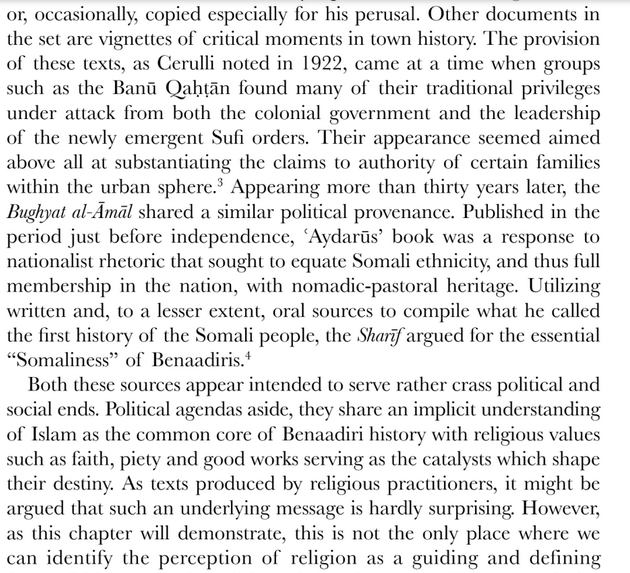
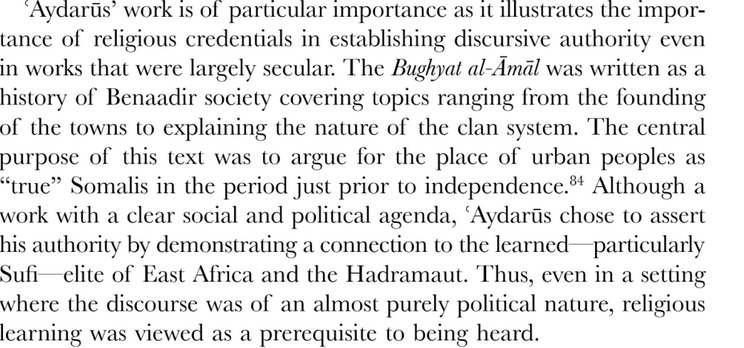
What book is this? And do you have a link?It requires careful scrutiny and re-examination. They can still actually tell us a lot, especially about the period they were written in and why/how they were written.
Sharif Ayadurus book ''Bughyat Al-Amal'' is a peculiar one in this respect. His book has many useful collections and important information in it, despite it being written with a clear social political agenda.


I imagine some of it was used as toilet paper during the civil war.
You don't have permission to view the spoiler content.
Log in or register now.
Idilinaa
VIP
It's the same book i linked in the first page. Renewers of the Age: Holy Men and Social Discourse in Colonial BenaadirWhat book is this? And do you have a link?
What will tell us the most if i feel are Qadi record books from the different towns. Like the one that survived in Barawa.
It's not concerned with chronicling/warfare (like the ones commissioned by ruling houses) , or a political-social narrative. It's just simple recording of facts. Instead dealing with legal disputes/resolutions, transactions, economic activities, purchases and aspects of daily life inside the towns. Social/human interactions between people and how the town inhabitants shared governance.
Same reason why Al-Umari's text on awfat/awdal/zayla stands out he is largely unconcerned with warfare and talks more about their economic, cultural and social life.
Last edited:
Idilinaa
VIP
It's the same book i linked in the first page. Renewers of the Age: Holy Men and Social Discourse in Colonial Benaadir
What will tell us the most if i feel are Qadi record books from the different towns. Like the one that survived in Barawa.
It's not concerned with chronicling/warfare (like the ones commissioned by ruling houses) , or a political-social narrative. It's just simple recording of facts. Instead dealing with legal disputes/resolutions, transactions, economic activities, purchases and aspects of daily life inside the towns. Social/human interactions between people and how the town inhabitants shared governance.
Same reason why Al-Umari's text on awfat/awdal/zayla stands out he is largely unconcerned with warfare and talks more about their economic, cultural and social life.
Forgot to include this.
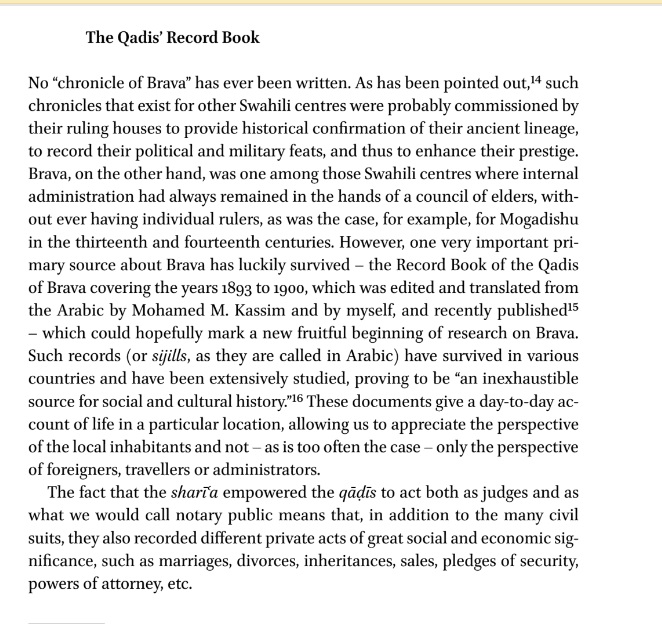
The first sentences to this go along with what i said on Page 1:
It's likely that the written historical production in Northern-Western Somalia took a different nature from South-Central(Mogadishu area) as it was mostly a state led enterprise concerned with documenting the struggle(Jihad) and political formation by central state actors as an extension of the political conflict and resistance to the Christian Abyssinia.
Last edited:
Yeah I've heard of this qadi book from barawe. One thing I find weird is how we don't know about any somali sultnates before the 1200's. . ( except the sultnate of mogadishu and possibly shewa) also it seem like nothing is known about somali history around the modern puntland region.Forgot to include this.

The first sentences to this go along with what i said on Page 1:
Idilinaa
VIP
Mogadishu might have been similar to Barawa because the earliest mention of it was that it was governed by a council of elder or guurti in Somali with no single individual ruler. Earliest mention of the town is in 1100s a bit later than the mentions of Northern ones.Yeah I've heard of this qadi book from barawe. One thing I find weird is how we don't know about any somali sultnates before the 1200's. . ( except the sultnate of mogadishu and possibly shewa) also it seem like nothing is known about somali history around the modern puntland region.
Not sure if Showa was a Somali sultanate. It was seems to be connected to the Dahklak Island's as an entrepoint and not Zayla. Practically vanished without a trace early on, so we unforunately don't know much about it.
We know that the Eastern Horn: Makhir-Bari in the Modern Puntland region had Muslim coastal towns and an organized sultanate on the coast from 900s, with later extension of inland towns (Nuggal) that acted as a vassal state to Awdal according to Arabic sources.

Awdal/Zaylac was also already a state by the late 900s and the ruling house expanded inland and captured Showa in the 1200s in an attempt to consolidate Muslim power according to internal chronicles:

which is also around the same time of the founding of Abyssinia as it expanded to capture Zagwe/D'mot which itself also an attempt to consolidate Christian power.
Last edited:
I wonder why there was no permanent urban elite in that region considering we have 19th centruy drawings of qandala and other walled towns.Mogadishu might have been similar to Barawa because the earliest mention of it was that it was governed by a council of elder or guurti in Somali with no single individual ruler. Earliest mention of the town is in 1100s a bit later than the mentions of Northern ones.
Not sure if Showa was a Somali sultanate. It was seems to be connected to the Dahklak Island's as an entrepoint and not Zayla. Practically vanished without a trace early on, so we unforunately don't know much about it.
We know that the Eastern Horn: Makhir-Bari-Nugaal in the Modern Puntland region had Muslim coastal towns and an organized sultanate on the coast from 900s, with later extension of inland towns that acted as a vassal state to Awdal according to Arabic sources.

Awdal/Zaylac was also already a state by the late 900s and the ruling dynasty expanded inland and captured Showa in the 1200s in an attempt to consolidate Muslim power according to internal chronicles:

which is also around the same time of the founding of Abyssinia as it expanded to capture Zagwe/D'mot which itself also an attempt to consolidate Christian power.
Idilinaa
VIP
I wonder why there was no permanent urban elite in that region considering we have 19th centruy drawings of qandala and other walled towns.
If you talking about the Eastern towns in the 19th century, there were permanent urban settlers spread out into different towns & villages on the coast. We even have the names of the Governors/Qadis, elites and lists of inhabitants.
It was in our musuem but dont know where it is nowThis is something that's been bothering me for a while. Mogadishu waa the largest city in somali and probably the horn of africa and even the swahili coast for several centuries and it's also one of the oldest. So why are there no chronicles? You have chronicles from harar . You even have the kilwa and pate chronicles (even though they're mainly from oral traditions ) it makes no sense to me why there is none for mogadishu or barawe or merca. Is anybody aware of the possible existence of a chronicle ? @Shimbiris @The alchemist @Emir of Zayla @Three Moons @daljirkadahsoon
It was in our musuem but dont know where it is now
@Banadiri Warrior do u know who this Mukarram is?
Yes Mucallim Mukarram lived during 13th hijri century , He's a Qadhi from Reer Faqi tribe@Banadiri Warrior do u know who this Mukarram is?
This is something that's been bothering me for a while. Mogadishu waa the largest city in somali and probably the horn of africa and even the swahili coast for several centuries and it's also one of the oldest. So why are there no chronicles? You have chronicles from harar . You even have the kilwa and pate chronicles (even though they're mainly from oral traditions ) it makes no sense to me why there is none for mogadishu or barawe or merca. Is anybody aware of the possible existence of a chronicle ? @Shimbiris @The alchemist @Emir of Zayla @Three Moons @daljirkadahsoon
Mogadishu was not subjugated by the Portuguese the way Kilwa, Pate and other cities were. This is why someone like Jaoa De Barros had zero access to Mogadishu’s written heritage or local history, but did record the oral history of Kilwa, and others, which were under Portuguese control. The Arabic version of the Kilwa chronicle was then written as a response to the Portuguese version.
That sort of incentive to regain the narrative against an occupying power didn’t exist in medieval Mogadishu because it was independent. There were also a higher frequency of succeeding dynasties in Mogadishu than in the aforementioned cities, so it’s very unlikely that you would have one specific all-encompassing chronicle covering the entire period, since they would have different record keepers.
Somali researchers have also pretty much neglected Somalia’s ‘Muriids’ who held the keys to saints’ tombs and kept the records. @Khaemwaset posted this a while back, showing an example of one such record-keeper who lived in the 1970s, but today you will not find that family chronicle on the internet or any library in the world, its just out there in the wind with a relative;
I wonder how many odays with these kinds of manuscripts are still around. Somalias real probelm is that while we have a cohesive identity the ruling elite do not buy into this identity. If we had a real aristocratic urbanizes elite. Then we could really develop all sorts of institute and fund projects that would gather these kinds of manuscriptsMogadishu was not subjugated by the Portuguese the way Kilwa, Pate and other cities were. This is why someone like Jaoa De Barros had zero access to Mogadishu’s written heritage or local history, but did record the oral history of Kilwa, and others, which were under Portuguese control. The Arabic version of the Kilwa chronicle was then written as a response to the Portuguese version.
That sort of incentive to regain the narrative against an occupying power didn’t exist in medieval Mogadishu because it was independent. There were also a higher frequency of succeeding dynasties in Mogadishu than in the aforementioned cities, so it’s very unlikely that you would have one specific all-encompassing chronicle covering the entire period, since they would have different record keepers.
Somali researchers have also pretty much neglected Somalia’s ‘Muriids’ who held the keys to saints’ tombs and kept the records. @Khaemwaset posted this a while back, showing an example of one such record-keeper who lived in the 1970s, but today you will not find that family chronicle on the internet or any library in the world, its just out there in the wind with a relative;
View attachment 326683
Idilinaa
VIP
I wonder how many odays with these kinds of manuscripts are still around. Somalias real probelm is that while we have a cohesive identity the ruling elite do not buy into this identity. If we had a real aristocratic urbanizes elite. Then we could really develop all sorts of institute and fund projects that would gather these kinds of manuscripts
Manuscript collections has zero to do with aristocratic or urbanized elites or cohesive identity. Most manuscripts by default are in private hands , excluding the few state commissioned texts or the Qadi produced records . Most manuscripts in Yemen and Oman for examples are in private hands and a large number of them are unreachable. Same for the Horn.
That's why they relied on people voluntarily donating them before the civil war. Can't really ask to hand over peoples personal/private property for the sake of collecting historical material.
Somali researchers have also pretty much neglected Somalia’s ‘Muriids’ who held the keys to saints’ tombs and kept the records. @Khaemwaset posted this a while back, showing an example of one such record-keeper who lived in the 1970s, but today you will not find that family chronicle on the internet or any library in the world, its just out there in the wind with a relative;
View attachment 326683
@Shimbiris take a look at this photo/caption. Interesting stuff.
Latest posts
-
Young somali kid almost got arrested for saying diri dhabe is somali city
- Latest: Keep it a boqol
-
-
